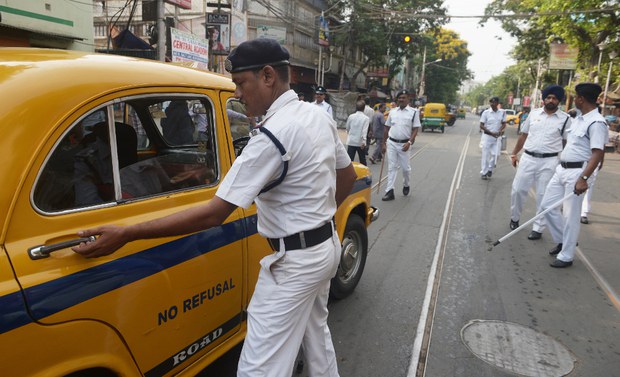India: West Bengal Grapples with Violence Tied to ‘Sand Mafia,’ Local Politics
2017.05.10
Kolkata and Guwahati, India
 Indian police check a car next to a polling station during state assembly elections in Kolkata, April 21, 2016.
Indian police check a car next to a polling station during state assembly elections in Kolkata, April 21, 2016.
Habsina Bibi doesn’t flinch as she blames a decades-old “political gang war” in the Indian state of West Bengal for her husband’s recent death.
Babar Ali, 31, Bibi’s husband, was among nine people killed on April 21 when homemade bombs accidentally went off at a house in Darbarpur, a village in Birbhum district, about 130 km (80 miles) from state capital Kolkata.
Police said Ali was involved in manufacturing crude bombs for an ongoing turf war over the control of the district’s 80-odd dry riverbeds that are exploited for illegal sand mining. The blast that killed nine people on April 21 is just one of many incidents of alleged political-related violence that occur routinely in West Bengal’s rural districts.
“They [police] say my husband was part of the sand mafia. But why do they not openly come out with names of people who control this mafia?” the 28-year-old widow told BenarNews as she accused police of protecting the “politically connected perpetrators.”
Police in West Bengal acknowledge that political pressure makes it hard for them to combat violence linked to the illegal trade, which, according to some reports, generates more than U.S. $120 million annually.
“A large majority of these illegal sand mines are backed by [the ruling] Trinamool Congress (TMC) and some of them are affiliated to the opposition. It becomes very difficult for us to do anything due to political pressure,” a senior Birbhum district police official told BenarNews on condition of anonymity.
Violence: ‘Template’ of state politics
The turf war over the illegal sand-mining trade stems from West Bengal’s long history of political violence, which has claimed hundreds of lives over at least four decades, an expert said.
“Political identity is the root cause of violence in West Bengal,” Samir Kumar Das, a professor of political science at the University of Kolkata, told BenarNews.
The cycle of violence began during the 34-year tenure in the state of the leftwing Communist Party of India-Marxist (CPI-M) and has persisted since the TMC came to power in West Bengal in 2011, Das said.
“Over the years, violence has become the template of West Bengal politics. The CPI-M used violence to subdue any opposition while it was in power for over three decades. The TMC is following the same footsteps,” Das said.
“It is a cause of great worry that these political outfits, in quest for power, are crushing the very innocent lives they claim to want to protect,” he said.
About 50 incidents of violence between workers affiliated to political outfits have occurred in West Bengal this year alone, according to police sources. However, no figures are available to determine an approximate casualty count in the fighting that has lasted decades.
At least one person was killed and three severely injured when a blast ripped through a TMC office building in Burdwan district on Sunday.
Residents alleged that police were downplaying the number of those killed because TMC party workers removed dead bodies soon after the explosion, according to The Hindu newspaper.
Parties exchange blame
The TMC blamed its principal opposition – the CPI-M – for carrying out the attack on its office in Pichkudijhal village, about 150 km (93 miles) from Kolkata.
“CPI-M workers who were riding on a motorbike hurled bombs at the TMC office. They are regularly targeting TMC workers in rural Bengal,” TMC leader Anubrata Mondal told BenarNews.
The opposition blamed the TMC.
“The ruling party is using innocent people and forcing them to make crude bombs. TMC party workers routinely make dead bodies disappear from blast sites to keep a lid on the actual death count,” CPI-M’s Sujan Chakraborty told BenarNews.
TMC lawmaker Firhad Hakim refuted Chakraborty’s charge, saying the ruling party did “not have a hand in any incident of violence in the state.”
“We came to power with a huge majority and still enjoy the support of the people of West Bengal. It is the Left [CPI-M] party workers who are involved in making bombs so they can spread violence and malign the image of our government,” Hakim told BenarNews.
And while the state’s politicians continue to pass the buck, Fatema Bibi and others are living in fear.
In the wake of the April 21 blast in Birbhum’s Darbarpur village most men, including her husband, fled the village, Fatema said.
“Whenever such blasts occur, police come and arrest just about anyone from the village, so they can show on paper they have taken action. The real perpetrators are never arrested,” Fatema told BenarNews.
Sundar Kundu, 41, another Birbhum district resident, echoed Fatema’s sentiments.
“The violence in West Bengal is getting scarier by the day. In the name of party rivalry, groups hurl bombs at each other at the drop of a hat. And while the police stand back and watch, villagers like us are becoming scapegoats,” Kundu told BenarNews.







